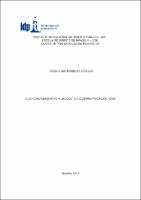Use este identificador para citar ou linkar para este item:
https://repositorio.idp.edu.br//handle/123456789/2939| Título: | A Lei Complementar n. 160/2017 e a guerra fiscal de ICMS |
| Autor(es): | Coelho, Diogo Lins Barbosa |
| Orientador(es): | Afonso, José Roberto Rodrigues Fuck, Luciano Felício |
| Palavras-chave: | Guerra fiscal;Benefícios fiscais unilaterais;LC n. 160/17;Convênio ICMS n. 190/17;Segurança jurídica |
| Data de submissão: | 2018 |
| Editor: | IDP/ EAB |
| Citação: | COELHO, Diogo Lins Barbosa. A Lei Complementar n. 160/2017 e a guerra fiscal de ICMS. 2018. 85 f. Dissertação (Mestrado em Direito Constitucional) – Instituto Brasileiro de Ensino, Desenvolvimento e Pesquisa, Brasília, 2021. |
| Resumo: | A Guerra Fiscal dos estados brasileiros em torno do ICMS, cujo recrudescimento se deu
a partir de meados da década de 90 do século passado, afasta o Estado brasileiro de um
federalismo de cooperação e causa prejuízos a todos os agentes envolvidos,
especialmente aos contribuintes que gozam ou gozaram desses benefícios. Com efeito,
os créditos fiscais decorrentes da não-incidência do imposto ficam sujeitos à glosa por
outros estados, afastando-se a não-cumulatividade do imposto. Além disso, o STF
consolidou sua jurisprudência no sentido da inconstitucionalidade desses benefícios,
representada pela PSV n. 69, além do recente posicionamento acerca da prospecção de
efeitos da decisão de inconstitucionalidade, nas ADIs 429/CE e 4481/PR. Em paralelo,
o relativo consenso político-normativo a que se chegou com o Convênio ICMS n. 70/14,
conferiram, respectivamente, as bases jurídicas e político-normativas para que o
Congresso Nacional aprovasse a LC n. 160/17. A nova legislação complementar teve
por escopo autorizar os estados e o DF, mediante condições nela previstas, a proceder à
remissão de créditos decorrentes de benefícios fiscais concedidos unilateralmente, à
revelia do CONFAZ, bem como a reinstituí-los por prazos de até 15 anos. Não obstante
a iniciativa de se tentar realizar a pacificação do passado de concessões irregulares de
benefícios, a nova legislação suscita dúvidas quanto à sua eficácia para atenuar os
efeitos da guerra fiscal do ICMS, uma vez que surgiu a par de um contexto mais amplo
de discussão acerca de uma reforma do sistema tributário brasileiro, com a redução da
alíquota interestadual do imposto e com a gradativa alteração da tributação das
mercadorias para o estado de destino. Além disso, previu a polêmica “regra da cola”,
que poderá representar uma nova rodada de concessões de benefícios fiscais. A previsão
de prazos demasiadamente extensos para a vigência desses benefícios, assim como a
inexistência de uma regra de transição para a extinção gradual destes, também contribui
para enfraquecer as já combalidas finanças estaduais, assim como para dar sobrevida ao
debate por ocasião do término desse prazo. |
| Abstract: | The "Tax War" of the Brazilian states around the ICMS, which grew in the middle of the 90s of the last century, distances the Brazilian State from a federalism of cooperation and causes damage to all the agents involved, especially to taxpayers who enjoy or enjoyed these kind of benefits. In fact, tax credits arising from the nonimposition of the tax are subject to gloss by other states, excluding the non-cumulative characteristic of the tax. In addition, the STF consolidated its jurisprudence in the sense of the unconstitutionality of these benefits, represented by PSV no. 69, in addition to the recent position on the prospect of effects of the decision of unconstitutionality, in ADIs nos. 429 / CE and 4481 / PR. In parallel, the relative political-normative consensus that emerged with the ICMS Agreement No. 70/14, respectively, gave the legal and political-normative bases for the National Congress to approve LC no. 160/17. The new complementary legislation had the purpose of authorizing the states and the Federal District, under conditions set forth therein, to proceed with the remittance of credits resulting from tax benefits granted unilaterally, in default of CONFAZ, as well as to reinstate them for periods of up to 15 years. Despite the initiative to try to pacify the past from irregular concessions of benefits, the new legislation raises doubts as to its effectiveness in mitigating the effects of the ICMS "tax war", since it emerged outside a broader context of discussion of a reform of the Brazilian tax system, with the reduction of the interstate tax rate and the gradual change from the proceeds of the collection to the state of destination of the goods. Besides that, the prediction of the controversial "copy" rule could represent a new round of tax benefit concessions. The existence of periods that are too long for these benefits to expire, as well as the absence of a transition rule for the gradual abolition of these benefits, also contributes to weakening the already weakened state finances, as well as to give the debate a chance to survive by the end of the deadline. |
| URI: | https://repositorio.idp.edu.br//handle/123456789/2939 |
| Aparece nas coleções: | Mestrado Acadêmico em Direito Constitucional |
Arquivos associados a este item:
| Arquivo | Descrição | Tamanho | Formato | |
|---|---|---|---|---|
| DISSERTAÇÃO_DIOGO LINS BARBOSA COELHO_MESTRADO EM DIREITO 2018.pdf | 547.14 kB | Adobe PDF |  Visualizar/Abrir |
Os itens no repositório estão protegidos por copyright, com todos os direitos reservados, salvo quando é indicado o contrário.
